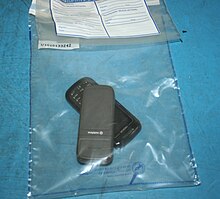


A security bag is a heavy duty bag used to contain high-value products or documents or legally sensitive items. Envelopes with security features are called security envelopes as well as security bags. Cash for deposit in a bank is often placed in a special deposit bag with security features.[1][2] When they are used to contain items related to a crime, special evidence bags are used.[3] Authentication of signatures and chain of custody are often required.
Construction[edit]
Security bags or envelopes may be specially designed plastic bags, paper bags, or fabric bags. Bags or envelopes can be made to be tamper resistant to make it difficult for unauthorized entry. It is often more important for these to be tamper evident so that an unauthorized entry is easily detected to have occurred.
Bags and envelopes are often closed by an integral pressure sensitive adhesive on the closing flap. The removal of a release liner allows convenient closing of the bag. Several types of security features can be included in the flap structure and are designed to indicate its opening irreversibly.[4][5][6][7][8][9][10]
Separate security tapes are also used. Tamper-indicating security seals employ a variety of mechanisms for operation, each with its own advantages and disadvantages.
Documentation such as labels for certified signatures for custody and chain-of-custody labels are frequently included.
Use[edit]
No one security feature can be considered as "tamper proof".[11] Layers of tamper-resistant and tamper-evident features, as well as the broader security systems are needed to provide better assurance of security. All security products can be foiled by a knowledgeable person with sufficient time and with access to specialized tools, solvents, extreme temperatures,[12] other security bags, security tapes, etc.
See also[edit]
- Currency packaging
- Dye pack
- Evidence management
- Provenance
- Package pilferage
- Security seal
- Traceability
Notes[edit]
- ^ "Sealed Bag deposit Process" (PDF). Northwestern University. 2016.
- ^ Bank of America (2015). "Preparing and Packaging Cash Vault Deposits" (PDF). Harvard University.
- ^ Warrington, D (April 1, 2008). "Evidence Packaging". Forensics.
- ^ US application 2006066096, Kan, Shen-Nan, "Adhesive tape structure for sealing and keeping secrecy", published 2006-03-30, now abandoned.
- ^ US 5918983, Palazzolo, John, "Security envelope", published 1999-07-06, assigned to Control Paper Co. Inc., now expired.
- ^ US 5788377, Vetter, Kurt W., "Tamper-resistant envelope", published 1998-08-04, assigned to Uniflex Inc.
- ^ US 5108194, Raden, David T., "Security bag", published 1992-04-28, now expired.
- ^ US application 2005036716, Geyer, Thomas, "Tamper indicating security bag", published 2005-02-17, assigned to Ampac Plastics LLC, now abandoned.
- ^ US 5631068, Smith, Christopher A., "Self-containing tamper evident tape and label", published 1997-05-20, assigned to Trigon Packaging Corp.
- ^ US 4449631, Levenberg, Nat & Levenberg, Alvin, "Tamper proof packaging", published 1984-05-22
- ^ Rosette, J L (2009), "Tamper-Evident Packaging", in Yam, K L (ed.), Encyclopedia of Packaging Technology, Wiley (published 2010), ISBN 978-0-470-08704-6
- ^ US 5798169, Smith, Christopher A., "Self-containing tamper evident seal", published 1998-08-25, assigned to Sealed Air Corp.
References[edit]
- Rosette, J L, ”Improving Tamper-Evident Packaging: Problems, Tests and Solutions", 1992
- Yam, K.L., "Encyclopedia of Packaging Technology", John Wiley & Sons, 2009, ISBN 978-0-470-08704-6